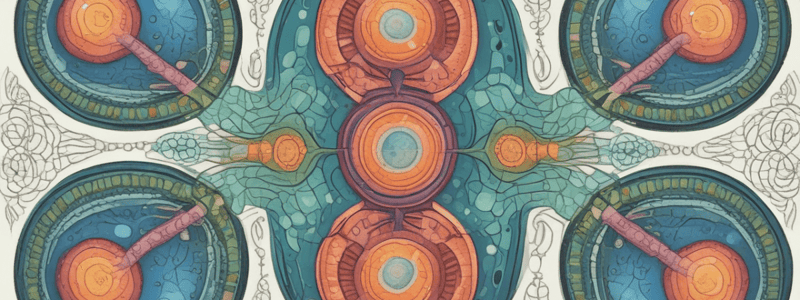Podcast
Questions and Answers
What is the primary focus of biology?
What is the primary focus of biology?
- Study of interactions between organisms (correct)
- Study of atoms and molecules
- Study of cellular division
- Study of genetics
In which type of cells does mitosis occur?
In which type of cells does mitosis occur?
- Stem cells
- Somatic cells (correct)
- Gonads cells
- Nerve cells
What is the main outcome of meiosis?
What is the main outcome of meiosis?
- Formation of identical daughter cells
- Maintenance of ecosystems
- Formation of sex cells (correct)
- Growth and maintenance of an organism
Which stage of mitosis involves the condensation of chromatin into chromosomes?
Which stage of mitosis involves the condensation of chromatin into chromosomes?
What is the role of mitosis in organisms?
What is the role of mitosis in organisms?
How many sets of chromosomes are present in each daughter cell after mitosis?
How many sets of chromosomes are present in each daughter cell after mitosis?
During which phase of meiosis do the chromosomes pair up and exchange genetic material?
During which phase of meiosis do the chromosomes pair up and exchange genetic material?
What happens in telophase of cell division?
What happens in telophase of cell division?
What is the main outcome of meiosis II?
What is the main outcome of meiosis II?
What is the significance of crossing over in meiosis?
What is the significance of crossing over in meiosis?
Which phase of cell division involves the sister chromatids moving towards opposite poles?
Which phase of cell division involves the sister chromatids moving towards opposite poles?
What can result from the double loss of NCOR1/2 coregulators in hepatocytes according to recent research?
What can result from the double loss of NCOR1/2 coregulators in hepatocytes according to recent research?
Study Notes
Biology: A Comprehensive Overview
Biology is the scientific study of living organisms and their interactions with the environment. It encompasses a wide range of topics, including anatomy, physiology, cell biology, biochemistry, genetics, and ecology. The field is vast and interdisciplinary, with researchers studying everything from the molecular structure of cells to the behavior of entire ecosystems.
Cellular Division: Mitosis and Meiosis
One of the most fundamental processes in biology is cellular division, which involves the replication of cellular components and the formation of new cells. Mitosis is a type of cell division that occurs in somatic cells (cells that are not involved in the production of sperm or eggs) and results in two identical daughter cells. Meiosis, on the other hand, is a type of cell division that occurs in the gonads (ovaries and testes) and results in the formation of sex cells (sperm and eggs). While mitosis is essential for the growth and maintenance of an organism, meiosis plays a crucial role in the reproduction and evolution of species.
Mitosis
Mitosis is a process of cell division that involves the duplication of chromosomes and the separation of the two sets of chromosomes into two identical daughter cells. The process consists of four main stages: prophase, metaphase, anaphase, and telophase. During prophase, the chromatin condenses into chromosomes, the nuclear envelope breaks down, and the mitotic spindle begins to form. In metaphase, the chromosomes align at the metaphase plate, which is a point equidistant from the two spindle poles. During anaphase, the sister chromatids separate and move towards opposite poles of the cell. In telophase, the chromosomes reach the poles, the nuclear envelope reforms, and the cell begins to elongate and divide.
Meiosis
Meiosis is a process of cell division that results in four sex cells, each with half the number of chromosomes as the original cell. Meiosis consists of two rounds of cell division: meiosis I and meiosis II. In meiosis I, the chromosomes pair up and exchange genetic material through a process called crossing over. The chromosomes then separate, with each daughter cell receiving a unique set of chromosomes. In meiosis II, the chromosomes duplicate, and the chromatids separate, resulting in four haploid sex cells.
Recent Developments in Biology
Recent advancements in biology have led to new discoveries and a deeper understanding of various biological processes. For instance, research has revealed unexpected consequences of double loss of the coregulators NCOR1 and NCOR2 (NCOR1/2) in hepatocytes of adult mice, which affects chromatin functioning and glucocorticoid receptor (GR)-mediated gene transcription.
Choosing a Biology Research Paper Topic
When writing a biology research paper, it is essential to choose a topic that is both interesting and supported by reliable sources. Some popular biology research paper topics include developmental biology, immunology, cell biology, genetics, molecular biology, neurobiology, and environmental science. It is also recommended to explore recent developments in the field to ensure that the paper is up-to-date with the latest research.
Studying That Suits You
Use AI to generate personalized quizzes and flashcards to suit your learning preferences.
Description
Test your knowledge on cellular division processes in biology, focusing on mitosis and meiosis. Learn about the stages and significance of mitosis in somatic cells, as well as the role of meiosis in the formation of sex cells. Explore recent developments in biology and how to choose a research paper topic in the field.




